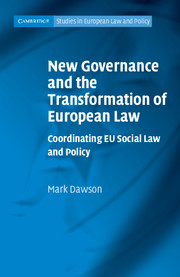Book contents
- Frontmatter
- Contents
- Series editors’ preface
- Acknowledgments
- Table of cases
- Table of treaties
- Table of legislation
- Table of Council Decisions
- Introduction
- 1 The origins of an Open Method of Coordination
- 2 Relating governance and law
- 3 Governance as proceduralisation
- 4 Assessing the procedural paradigm
- 5 Constitutionalising new governance
- Epilogue The future of the Open Method of Coordination
- Annex 1 Questions for the respondents
- Annex 2 List of non-governmental respondents
- Annex 3 History and development of the OMC SPSI (1997–2010)
- Annex 4 The new ‘streamlined’ OMC SPSI (2008–10)
- Bibliography
- Index
3 - Governance as proceduralisation
Published online by Cambridge University Press: 05 November 2011
- Frontmatter
- Contents
- Series editors’ preface
- Acknowledgments
- Table of cases
- Table of treaties
- Table of legislation
- Table of Council Decisions
- Introduction
- 1 The origins of an Open Method of Coordination
- 2 Relating governance and law
- 3 Governance as proceduralisation
- 4 Assessing the procedural paradigm
- 5 Constitutionalising new governance
- Epilogue The future of the Open Method of Coordination
- Annex 1 Questions for the respondents
- Annex 2 List of non-governmental respondents
- Annex 3 History and development of the OMC SPSI (1997–2010)
- Annex 4 The new ‘streamlined’ OMC SPSI (2008–10)
- Bibliography
- Index
Summary
Introduction
The last chapter sketched out the skeleton of an ‘inside’ theory of the relationship between governance and law. It is not yet, however, clear what seeing governance ‘inside’ legal categories really means. If the OMC is law, it is unlike most of the laws we see in the EU, or its member states. This comes through in the method’s characterisation as ‘soft’. While the OMC carries forward legal functions, it is not law in the proper sense; it lacks the ability to sanction and enforce conduct which ‘real’ law-making implies. Given these facts, it is easy to see ‘new governance’ as a threat to law-mediated rule, or alternatively, as parallel to the Union’s ‘official’ constitutional structure. It is simpler to adopt a ‘negative’ definition; to see OMC-like methods as external to law, or as elements of a more directly ‘political’ form of rule.
The purpose of the last two chapters has been to dispute and contest this argument. Firstly, there may be significant continuities between hard and soft legal programmes. The association of law with sanction – long an obsession of eighteenth and nineteenth century jurisprudence – is not as relevant as it once was. Indeed it may be a particularly difficult task in the EU context, where the implementation of legal rules also requires the cooperation and consent of national administrative and judicial authorities. The reality of European social law implies not only the rise of ‘new governance’, but the presence of framework directives, social dialogues and other soft methods, which in combination have created a loose legal infrastructure. This implies that the association of legality with hard, determining and hierarchical rules should not be taken for granted.
- Type
- Chapter
- Information
- New Governance and the Transformation of European LawCoordinating EU Social Law and Policy, pp. 103 - 163Publisher: Cambridge University PressPrint publication year: 2011



